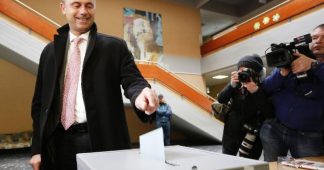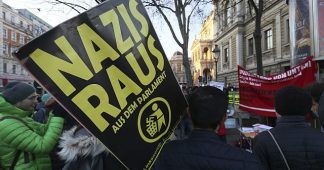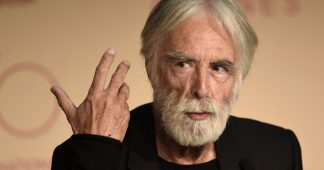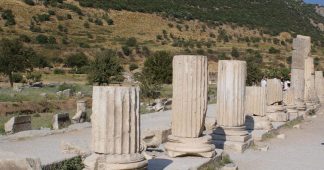By Stefan Steinberg
20 March 2018
This is the third in a series of articles on the recent Berlin International Film Festival, the Berlinale, held February 15-25, 2018. The first part was posted March 14, and the second on March 16.
The Waldheim Waltz (Waldheims Walzer) by veteran Austrian filmmaker Ruth Beckermann—screened at the recent Berlinale—is an important and timely film. The documentary deals with right-wing politician Kurt Waldheim’s campaign for Austrian president in 1985-86.
The events surrounding his campaign and subsequent election in June 1986 played a major role in uncovering the real role played by Austria’s ruling elite in the Second World War.
In 1938, shortly after the German annexation of Austria and prior to the war, Waldheim joined the National Socialist German Students’ League, affiliated with the Nazi Party. He later became a member of the SA (Nazi “Brownshirts”) Mounted Corps.
During the war, Waldheim served on the staff of German Army Group E, which specialized in brutal anti-partisan operations in Greece and Yugoslavia from 1942 to 1945. In this capacity, as early as March 1943, he became part of the German military administration in Thessaloniki. Army Group E was involved in the deportation of the city’s Jewish population to destruction in concentration camps. At that time, Jews constituted a third of the total population of the city.
Remaining silent on his activities at that time, Waldheim was able to pursue a successful political career after the war. He was Austria’s foreign minister from 1968 to 1970, General Secretary of the United Nations from 1972 to 1981 and Austrian president from 1986 to 1992. Waldheim’s lies and obfuscations regarding his past were symptomatic of the response of the entire Austrian elite.
As Beckermann points out in the interview below, after World War II Austrian authorities claimed the country had been a victim of Hitler, and emphasis was continually placed on the number of Austrian casualties in the war (including all the Austrian citizens who had fought alongside the Nazis). This version of history effectively blotted out the country’s role in the Holocaust. It was the Austrian establishment’s big lie.
The truth about Waldheim’s role in the war emerged from research undertaken by the World Jewish Congress (WJC), based in America. As a young woman, Ruth Beckermann was a member of the initially small group of activists in Austria who politically intervened and recorded Waldheim’s election campaign. Beckermann’s own video footage from that time of meetings for and protests against Waldheim is combined with carefully selected recordings of testimony by members of the WJC, television interviews with Waldheim and many others involved in the campaign.
In the increasingly heated atmosphere of the election campaign, supporters of Waldheim fiercely defended their candidate and became increasingly hostile to those, including Beckermann herself, calling upon him to address his wartime collaboration with the Nazis. The aggressive reaction by Waldheim supporters also included openly anti-Semitic jibes and threats.
In 1996, Beckermann released her film East of War (Jense its des Krieges) dealing with a related subject—the 1995 “German Wehrmacht Army Exhibition” (Wehrmachtsausstellung), the first such event in postwar Germany to deal with the crimes committed in World War II by the German army. The exhibition travelled to 33 German and Austrian cities and attracted some 800,000 visitors.
In that documentary Beckermann interviewed visitors to the exhibition who either had experienced or were involved in Nazi war crimes. She noted in her film journal at that time, “Looked through the film material so far. Here they are again, the men that I filmed during the Waldheim campaign ten years ago.”
Now, more than thirty years later, Beckermann’s new film assumes burning importance under conditions where the ultra-right Freedom Party of Austria (FPÖ) now governs the country in alliance with the conservative Austrian Peoples Party (ÖVP).
I spoke to Ruth Beckermann:
Stefan Steinberg: Could you explain the significance of your film about Kurt Waldheim in relation to Austria’s postwar history?
Ruth Beckermann: Following World War II, Austria claimed it had been a victim of Hitler. It was the country’s big lie. Part of this lie was masking the role played by Austria in the oppression of the Jews. I remember as a small child a neighbour showing me a menorah, the traditional Jewish candle holder. He said it had been given to him, but I knew even at that young age it was obviously part of the property stolen from Jews who had been sent to the camps.
Such things were common knowledge in Austria after the war, but nobody said a thing. The Waldheim affair was the first time all this came to the surface. It had an enormous impact.
There had been rumours before about Waldheim’s past, for example in the 1960s, but the publicity surrounding his presidential campaign in 1986 made it possible to conduct an important debate about his role, and the role of Austria under the Nazis. It also revealed the extent to which anti-Semitism still prevailed.
The timing of the affair was significant. 1986 also marked the beginning of the political ascendancy of Jörg Haider [1950-2008], leader of the fascist Freedom Party. It appears the gradual eclipsing of one right-winger, Waldheim, opened up opportunities for another.
The difference is that Haider openly acknowledged Austria’s role in the war, while Waldheim sought to cover it up. When he was no longer able to deny the allegations made against him, Waldheim responded in the well-known manner, i.e., that he had only been doing his “duty.” [In an interview with the ORF national television network in March 1986, Waldheim claimed, “I did nothing during the war that was not also done by hundreds of thousands of Austrians, that was my duty as a soldier.”—Steinberg].
For Waldheim, this was true. His family had deep roots in the Austrian People’s Party [actually, its predecessor, the Christian Social Party] before the war. If Waldheim wanted to make a political career in the party then he had to accommodate to the Nazis.
Stefan Steinberg: In the film we witness the extraordinary statement in defence of Waldheim by the Social Democratic [SPÖ] leader and one-time Austrian chancellor Fred Sinowatz.
Ruth Beckermann: If you examine the political parties and main institutions, the police, the army, the judiciary, there was a broad continuity in terms of personnel from the period of the war, and that included the SPÖ. That explains why the Social Democrats provided political cover for those conservatives who contended that Waldheim’s service in an SA cavalry unit didn’t make him a Nazi. When confronted with the charge of Waldheim’s collaboration, Sinowatz declared on television, “Waldheim wasn’t a Nazi, only his horse was.”
Stefan Steinberg: What was the role of the US in the Waldheim affair?
Ruth Beckermann: Washington sought to use the Waldheim affair to undermine the United Nations. It was a period of decolonisation. Nations had freed themselves from their old colonial rulers and could express themselves for the first time at the United Nations.
The PLO [Palestine Liberation Organization] was active at the time. Under these conditions, the US administration sought to use the case of Waldheim to undermine and discredit the UN as a whole. In 1987, the US Justice Department announced it was putting Waldheim on a watchlist, meaning that he could not enter the US.
Stefan Steinberg: Your film is very relevant to the current situation, where the current Austrian government is a coalition of the ÖVP and the far-right Freedom Party. Leading German newspapers have been supportive of the new coalition, arguing that the Freedom Party is now mainstream.
Ruth Beckermann: The Freedom Party is not mainstream. It’s not true. It is the extreme right. At the start of the year one of the ministers in the new government, Interior Minister Herbert Kickl, went so far as to say he wanted refugees and asylum seekers to “concentrate at one place.” He said they should be “concentrated” into special centres. [This was seen as a reference to concentration camps.]
At the time of the first Austrian government involving the Freedom Party, in 2000, there was broad condemnation of the party led by Haider, including from the European Union. Now nobody says anything. Viktor Orbán [far-right Hungarian prime minister] has been to Vienna to meet up and make plans with the new government. The Freedom Party has taken over key ministries and is developing politics for the future. It is a dangerous situation.











